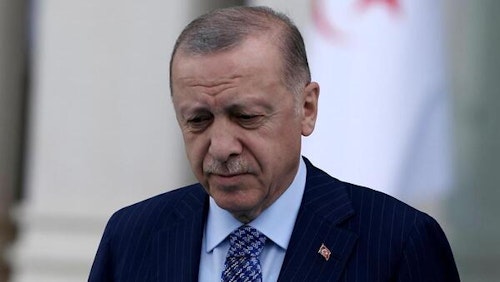Vadim Shishimarin, the first Russian soldier being tried for war crimes in Ukraine has pleaded guilty, acknowledging all the charges against him, which include war crimes and premeditated murder.
Read our latest coverage of Russia's war in Ukraine below.
 ADVERTISEMENT
ADVERTISEMENT
 ADVERTISEMENT
ADVERTISEMENT

 ${title}
${title}
Live ended
Wednesday's key developments
The first Russian soldier being tried for war crimes in Ukraine has pleaded guilty, acknowledging all the charges against him.
Moscow claims that close to a thousand soldiers from Azovstal steelworks in Mariupol have surrendered since Monday. Their fate is now uncertain.
The European Commission has unveiled an ambitious plan for independence from Russian fossil fuels which will require an extra €210 billion in investments by 2027.
NATO envoys failed to reach a consensus Wednesday on whether to start membership talks with Finland and Sweden, diplomats said, as Turkey renewed its objections to the two Nordic countries joining. Earlier, both countries formally submit their applications to join the NATO military alliance.
Human Rights Watch accuses Russia in a new report of summary executions, torture and other abuses during their occupation of areas around Kyiv and Chernihiv early in the conflict.
Meanwhile, the US has launched a programme to research, document and publicise potential war crimes committed by Russian troops in Ukraine.
- Russia is holding 3,000 civilians in a former penal colony, says Ukraine's human rights ombudsman.
Belarus has introduced the death penalty for preparing an attack or "attempting an act of terrorism", charges that target many opposition activists. A wave of sabotage has tried to make it harder for Russia to deploy forces in Ukraine.
The US has mobilised about three times as much support for Ukraine as the EU, according to the German think tank the Kiel Institute for the World Economy. On Wednesday tte European Commission proposed a €9 billion loan to Ukraine.
The US has become the latest Western country to reopen its embassy in Kyiv, after a three-month closure.
Austria will retain its military neutral status, says the country's foreign minister.
That's the end of our live coverage for tonight. Join us on Thursday from 0600 CET for more updates.
NATO talks with Finland and Sweden falter
NATO envoys failed to reach a consensus Wednesday on whether to start membership talks with Finland and Sweden, diplomats said, as Turkey renewed its objections to the two Nordic countries joining.
The envoys met at NATO's headquarters in Brussels after Finland and Sweden’s ambassadors submitted written applications to join the military organization, in a move that marks one of the biggest geopolitical ramifications of Russia's war on Ukraine — and which could rewrite Europe’s security map.
The diplomats, who did not want to be named because of the sensitive nature of the proceedings, declined to say who or what was holding up the procedure. They pointed to the messages from many of the 30 NATO allies welcoming Finland and Sweden's request.
Lithuanian Ambassador Deividas Matulionis told Swedish and Finnish media that the envoys had exchanged views about their national security. “The discussion was about that, but it is up to Turkey to comment,” he said.
NATO officials also refused to provide details. They underlined remarks earlier Wednesday by Secretary-General Jens Stoltenberg, that “we are determined to work through all issues and reach a rapid conclusion.” Meetings and diplomatic outreach aimed at resolving the problem will continue.
In a meeting with Secretary of State Antony Blinken at the United Nations, Turkish Foreign Minister Mevlut Cavusoglu offered mixed signals. He affirmed his country’s support for NATO’s “open-door” policy and its understanding of Finland and Sweden's desire to join the alliance. But he also repeated Erdogan’s demands that Turkey’s security concerns about the candidate nations be addressed.
White House national security adviser Jake Sullivan said Finland and Sweden's formal application to NATO is "a watershed moment in European security," adding that he was "confident" that despite Turkey's objections, the two countries will have "an effective and efficient accession process."
(AP)
Guterres urges Russia to unblock Ukrainian cereal exports
UN Secretary-General Antonio Guterres on Wednesday called on Russia to free up Ukrainian cereal exports and on the West to open up access for Russian fertiliser to world markets, in order to effectively tackle the global food crisis.
"Russia must allow the safe and secure export of these cereals stored in Ukrainian ports," he told a ministerial meeting in New York hosted by the US.
"Alternative transport routes" to the sea outflow of this grain, including filling silos in Odessa, "can be explored -- even if we know that this will not be enough to solve the problem", he added.
At the same time, "Russian food and fertilisers must have full and unrestricted access to world markets", the UN chief said.
These fertilisers are not subject to Western sanctions against Moscow after the 24 February invasion of Ukraine, but Russia has decided to stop their export. Their purchase by foreign countries may also be blocked by measures taken against the Russian financial system, according to diplomats.
Antonio Guterres has been negotiating on both issues for several weeks with Russia, Ukraine, the United States, the European Union and Turkey, which can help with mine clearance near Ukrainian ports and guarantee the movement of ships.
"I am hopeful, but there is still some way to go. The complex security, economic and financial implications require goodwill on all sides," he said, declining to say more so as not to jeopardise the chances of a deal.
(AFP)
Russia closes down Canada's CBC broadcaster
A Russian Foreign Ministry official has announced the closing of the Moscow bureau of Canada's CBC broadcaster in response to Canada ceasing the broadcasting of state-funded Russian TV channels.
Ministry spokeswoman Maria Zakharova said Wednesday that CBC has “essentially turned into a propaganda megaphone which broadcasts fake and doubtful information related to our country.”
Zakharova said that “when practical actions were taken targeted at Russian media outlets ... we obviously responded in essentially the same way.”
CBC spokesman Chuck Thompson said CBC/Radio-Canada is deeply disappointed.
“We have maintained a bureau in Moscow for more than 44 years and are currently the only Canadian news organization with a permanent presence in the country,” he said. “To our knowledge, this is the first time in the history of CBC/Radio-Canada that a foreign government has forced the closure of one of our bureaus.”
(AP)
Russian director condemns war at Cannes film premiere
Exiled Russian director Kirill Serebrennikov spoke out against the war in Ukraine following the global premiere of his film "Tchaikovsky's wife," at the Cannes Film Festival on Wednesday.
"No to the war," he said in Russian, as he received a standing ovation for his 19th century drama, the only film entry by a Russian director.
One of 21 films vying for the coveted Palme d'Or prize, Serebrennikov's movie highlights the destructive marriage of Russian composer Piotr Tchaikovsky to a young woman.
It traces the transformation of Antonina, played by Alena Mikhailova, from a pious and determined suitor to a rejected spouse in an ill-fated marriage.
Tchaikovsky, who prefers the company of men, is portrayed as a troubled and charismatic genius, repelled by his young wife and his decision to marry her.
(Reuters)
EU wants to help member states with defence post-Russian invasion
The European Commission wants member states to spend more on defence and to help them do it more efficiently, as it looks to better manage the bloc's capabilities following Russia's invasion of Ukraine.
In the short-term, it wants member states to replenish weapons stockpiles, at the same time as replacing Soviet-era equipment and reinforcing air and missile defence systems.
More from Euronews Brussels Bureau:
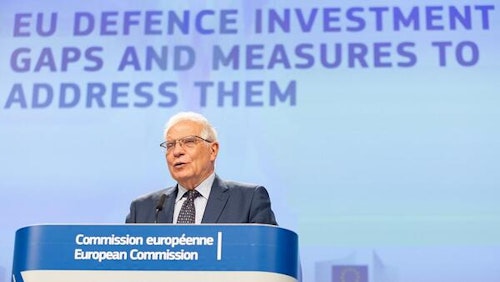
Brussels wants to help EU countries with defence spending
The EU treaties forbid the Commission from financing military projects. #EuropeNewsUS reopens embassy in Ukraine after 3 months
The United States has re-opened its embassy in Ukraine three months after shuttering it and withdrawing American diplomats from Kyiv ahead of Russia’s invasion in February.
The State Department said U.S. embassy operations in Kyiv resumed Wednesday, with diplomats returning on permanent basis to the capital from where they had been temporarily relocated to the western Ukrainian city of Lviv and neighboring Poland.
Secretary of State Antony Blinken said that “the Ukrainian people, with our security assistance, have defended their homeland in the face of Russia’s unconscionable invasion, and, as a result, the Stars and Stripes are flying over the Embassy once again."
Other Western countries have been re-opening their embassies.
U.S. embassy staffers had begun returning to Kyiv on a limited basis on May 8 to mark the anniversary of WWII Victory in Europe day but the embassy itself remained closed.
(AP)
Biden 'strongly supports' Finnish and Swedish NATO applications
U.S. President Joe Biden on Wednesday called Finland and Sweden’s decision to seek membership in NATO “historic” and said he would “strongly support” the applications.
Biden is set to meet Finnish President Sauli Niinisto and Swedish Prime Minister Magdalena Andersson in Washington on Thursday to discuss their NATO memberships bids and the situation in Ukraine.
“Finland and Sweden are longtime, stalwart partners of the United States,” Biden said in a statement. “By joining NATO, they will further strengthen our defense cooperation and benefit the entire Transatlantic Alliance.”
(AP)
EU plan to become independent from Russian fossil fuels
The European Commission has unveiled an ambitious plan for independence from Russian fossil fuels which will require an extra €210 billion in investments by 2027.
Full story from Euronews Brussels Bureau here:
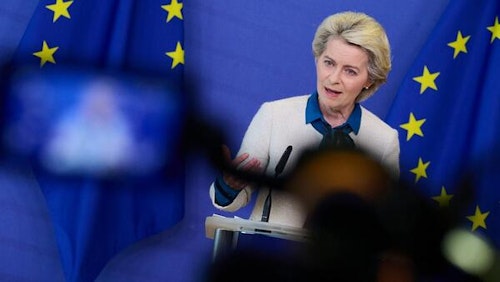
Five things to know about EU's big plan to cut Russian fossil fuels
The European Commission has unveiled an ambitious plan which will require an extra €210 billion in investments by 2027. #EuropeDecodedMeet the Ukrainian artist ordered to paint Kharkiv
Recognised internationally for his black and white artwork, Hamlet Zinkovsky is now using his talent to support the Ukrainian war effort by painting the streets of his war-torn home town.
Read the full story here:
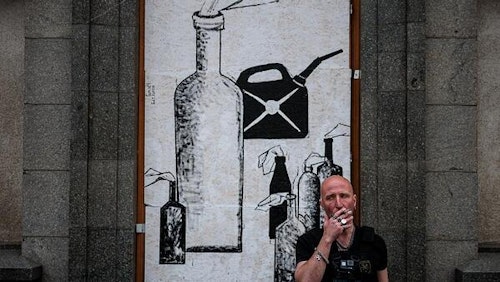
Meet the Ukrainian artist painting molotovs in the streets of Kharkiv
International street artist Hamlet Zinkivsky is back in his hometown of Ukraine to fill the war-torn streets of Kharkiv with his artwork. He hopes to inspire the local residents to "fight and defend".Germany to donate tanks to Czech Republic
Czech Defense Minister Jana Cernochova says Germany will donate 15 Leopard 2 A4 tanks to the Czech armed forces.
Cernochova says she has struck a deal with her German counterpart Christine Lambert. She says the move shows Germany’s appreciation of her country’s military help to Ukraine facing Russia’s aggression.
The Czechs have given Ukraine unspecified Soviet-era heavy weapons worth at least $130 million.
Cernochova said Wednesday that the tank deal is “great news for the Czech army.”
She said the tanks are ready for combat and the deal includes spare parts and ammunition. They should be delivered this year.
The minister also says the Czechs have opened talks with Germany about purchasing up to 50 more new Leopard A7+ tanks.
(AP)
Russia to watch effects of Sweden's NATO bid
Russia says it told Sweden on Wednesday that its response to the Nordic nation joining NATO will be based on how the alliance deploys its military strength in the future.
In a statement, the Russian Foreign Ministry said officials met with Swedish Ambassador Malena Mard at her request and that she notified Moscow about Sweden’s NATO ambitions.
The Foreign Ministry said it responded that “the choice of ways to ensure national security is the sovereign right of each state, but together with that, it should not create threats to the security of other countries.”
The ministry added that Moscow's reaction would depend on NATO weapons deployments to Sweden.
Russia's “specific reaction and possible responsive measures, including the military-technical side, will to a large extent depend on the real consequences of the integration of Sweden into the North Atlantic Alliance, including the deployment on Swedish territory of foreign military bases and offensive weapons systems,” the ministry said.
(AP)
Russian gymnast banned after displaying Z symbol
Russian gymnast Ivan Kuliak has been given a one-year ban for displaying a symbol on his uniform supporting the invasion of Ukraine.
Kuliak had taped the “Z” symbol — seen on Russian tanks and military vehicles in Ukraine and embraced by supporters of the war — to his vest for a medal ceremony at a World Cup event in March.
Along with the ban, Kuliak must return the bronze medal he won in parallel bars, the International Gymnastics Federation said. He will also have to return the prize money of 500 Swiss francs.
The 20-year-old Kuliak had stood next to a gold medalist from Ukraine on the podium in Doha, Qatar.
“If the protective measures keeping Russian athletes from competing are still in place on 17 May 2023, the ban shall continue and expire six months after the removal of said measures,” the federation's disciplinary commission said in its ruling.
The commission found that Kuliak breached federation statutes of discipline, ethics, code of conduct and technical regulations “when he wore the letter ‘Z’ on his singlet during the competition and the award ceremony.”
Kuliak, a former national junior all-around champion who did not compete at the Tokyo Olympics, can appeal within 21 days.
The panel said no violations were established against Russian delegation leader Valentina Rodionenko and coach Igor Kalabushkin.
Kuliak has said he had no regrets about the display and that he would always stand for peace.
"I saw it with our military and looked at what this symbol means. It turned out (it means), 'for victory' and 'for peace'," he added. "I didn't wish anything bad on anyone, I just showed my position."
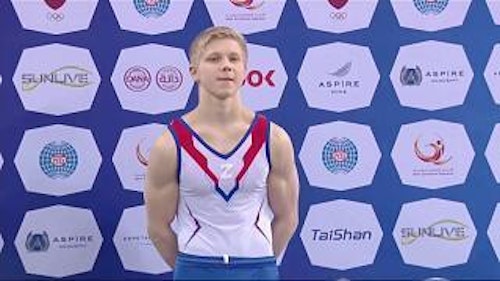
Russia to expel Spanish diplomats too
Russia says it is expelling 27 Spanish diplomats after announcing the expulsion of dozens of diplomats from France and Italy.
Moscow said on Wednesday the move is in response to the expulsion of Russian diplomats last month from Spain.
Earlier, the Russian Foreign Ministry said the country was expelling 34 French and 24 Italian diplomats.
Multiple European countries expelled Russian diplomats last month after accusing Russian forces of killing civilians in Bucha and other towns outside Kyiv, accusations the Kremlin has fiercely denied.
(AP)
First Russian soldier on trial for war crimes pleads guilty
The first Russian soldier being tried for war crimes in Ukraine has pleaded guilty, acknowledging all the charges against him, according to AFP.
Asked if he 'unreservedly' admitted the entire act, including the war crime and premeditated murder charges, 21-year-old non-commissioned officer Vadim Shishimarin said "yes".
Shishimarin, who is on trial in Kyiv, faces a possible life sentence.
Ukrainian prosecutors said Shishimarin was commanding a unit in a tank division when his convoy came under attack. He and four other soldiers stole a car, and as they were travelling near the village of Shupakhivka in the Sumy region they encountered a 62-year-old man on a bicycle.
"One of the soldiers ordered the accused to kill the civilian so that he would not denounce them," the prosecutor's office said.
Shishimarin then fired a Kalashnikov assault rifle from the window of the vehicle and "the man died instantly, a few dozen metres from his home", prosecutors added in a pre-trial statement.
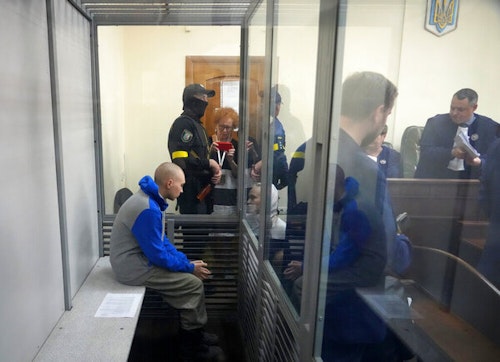
European Commission proposes €9bn loan for Ukraine, and post-conflict aid
The European Commission proposed on Wednesday a €9 billion loan to Ukraine, to help keep the country going as it struggles to fend off Russian aggression.
"We are proposing to top up the significant short-term relief provided until now, with a new exceptional macro-financial assistance for Ukraine of up to €9 billion in 2022," Commission President Ursula von der Leyen said.
"But we also need to think about the day after for the wider reconstruction effort. The EU would and should not be the only one contributing to this effort," she added.
"That is why we propose a reconstruction platform as part of this plan jointly led by Ukraine and the Commission and bringing together EU Member States, other bilateral or international donors, international financial institutions, and other like-minded partners," she said.
Russia to expel 34 French diplomats in tit for tat
Russia's foreign ministry said on Wednesday that it was expelling 34 French diplomats in a retaliatory move.
In April, France kicked out 35 Russians with diplomatic status as part of a broader wave of expulsions that ultimately saw more than 300 Russians sent home from European capitals, reports Reuters.
Later that month France's foreign ministry declared six Russian agents posing as diplomats as "persona non grata" after an investigation by the domestic intelligence services concluded they were working against French national interests.
According to AFP, Russia also announced Wednesday the expulsion of 24 Italian and 27 Spanish diplomats.
Top-ranking commanders remain in Azovstal, says pro-Russian leader
Top-ranking Ukrainian commanders have not yet surrendered from the labyrinth of bunkers and tunnels below the Azovstal steel works in Mariupol, the leader of the Russian-backed separatist region of Donetsk said on Wednesday.
As the most devastating siege in Russia's invasion moves towards a finale, nearly 1,000 Ukrainian fighters who barricaded themselves into the tunnels have so far given themselves up to Russian and pro-Russian forces since Monday.
Russia's defence ministry said that in the past day 694 Ukrainian fighters - including members of the Azov regiment - had surrendered, including 29 wounded.
It was unclear if the top commanders would leave the plant, or possibly even fight a last mortal battle with the Russian forces they regard as occupiers of their motherland.
"There are no commanders of the highest level (among those who surrendered) - they have not left," said Denis Pushilin, head of the breakaway Donetsk People’s Republic which was officially recognised by President Vladimir Putin just three days before the invasion of Ukraine.
(Reuters)
Turkey 'cannot say yes' to Finland and Sweden's NATO bids
Turkish President Recep Tayyip Erdogan, who is threatening to block Finland and Sweden's NATO membership, hoped on Wednesday that his "allies will hear (our) concerns" and "support us."
"We can't say yes," he repeated. "Supporting terrorism and asking for (our) support is a lack of coherence."
Erdogan accuses the two Nordic countries of hosting members of the PKK, the Kurdistan Workers' Party that he considers a terrorist organisation.
You can read more on why Ankara is threatening to derail Finland and Sweden's NATO applications here:
Why does Turkey want to block Finland and Sweden from NATO?
euronewsExperts say the three might end up in negotiations together with the rest of NATO, despite claims by Turkish President Erdogan that sending diplomats will not result in a change of stance in Ankara. #EuropeNewsRussia accuses Ukraine of 'complete unwillingness' to continue peace talks
Kremlin spokesman Dmitry Peskov said on Wednesday that there was no movement in peace talks with Ukraine, and that Kyiv was showing a total unwillingness to continue them.
"Negotiations are not progressing and we note the complete unwillingness of Ukrainian negotiators to continue this process", Peskov said.
On Tuesday Interfax news agency cited Russian Deputy Foreign Minister Andrey Rudenko as saying that Russia and Ukraine were not holding talks "in any form", and that Kyiv had "practically withdrawn from the negotiation process".
(Reuters)
US financial support strongest for Ukraine
The United States has mobilised about three times as much support for Ukraine as the European Union, according to figures compiled by a German think tank.
The Kiel Institute for the World Economy said Wednesday that a new aid package passed by the US House of Representatives takes American military, financial and humanitarian support for Ukraine to almost €43 billion between 24th January and 10th May.
The institute found that aid from the EU amounted to just under €16 billion during the same period. However, some countries in the 27-nation bloc have shied away from giving the value of their Ukraine aid, particularly for arms supplies.
Compared to their gross domestic products, Estonia, Latvia and Poland have provided the most support, ahead of the United States, according to the think tank's calculations.
(AP)
German ex-leader Schroeder loses privileges over Russia ties
Germany's three governing parties plan to strip former Chancellor Gerhard Schroeder of his office and staff after he maintained and defended his long-standing ties with Russia despite the war in Ukraine.
Schroeder's own Social Democratic Party said Wednesday that lawmakers on the parliamentary budget committee had agreed to link some of the former German leader's privileges to actual duties, rather than his status as former chancellor.
They planned to submit a proposal to lawmakers on Thursday.
Schroeder has become increasingly isolated in recent months due to his work for Russian state-controlled energy companies.
The 78-year-old is chairman of the supervisory board of Russian state energy company Rosneft and also has been involved with the Nord Stream and Nord Stream 2 gas pipeline projects.
Earlier this year his office staff quit and Schroeder faced a fresh wave of outrage from former political allies after the New York Times quoted him saying that the massacre of civilians in Bucha “has to be investigated” but he didn’t think the orders would have come from Russian President Vladimir Putin, who is a longtime friend.
(AP)
Human Rights Watch accuses Russia of summary executions, torture and other abuses
According to Human Rights Watch, Russian forces controlling much of the Kyiv and Chernihiv regions in northeastern Ukraine from late February through March 2022 subjected civilians to summary executions, torture and other grave abuses that are apparent war crimes.
In a detailed report released today, the international NGO said that in 17 villages and small towns in Kyiv and Chernihiv regions visited in April it had investigated 22 apparent summary executions, nine other unlawful killings, six possible enforced disappearances, and seven cases of torture.
Twenty-one civilians described unlawful confinement in inhuman and degrading conditions, it added.
“The numerous atrocities by Russian forces occupying parts of northeastern Ukraine early in the war are abhorrent, unlawful, and cruel,” said Giorgi Gogia, associate Europe and Central Asia director at Human Rights Watch. “These abuses against civilians are evident war crimes that should be promptly and impartially investigated and appropriately prosecuted.”
Human Right Watch said it interviewed 65 people between 10th April and 10th May, including former detainees, torture survivors, families of victims and other witnesses. It also examined physical evidence at the locations where some of the alleged abuses took place, as well as photos and videos shared by victims and witnesses.
According to the report, civilians described being held by Russian forces for days or weeks in dirty and suffocating conditions at sites such as a schoolhouse basement, a room in a window manufacturing plant and a pit in a boiler room, with little or no food, inadequate water, and without access to toilets. In Yahidne, Russian forces held over 350 villagers, including at least 70 children, five of them infants, in a schoolhouse basement for 28 days. There was little air or room to lie down, and people had to use buckets for toilets.
Austria will retain its military neutral status, says foreign minister
The foreign minister of Austria said his country would retain its neutral status even as EU allies Sweden and Finland overhauled decades-long foreign policy stances to apply for NATO membership in light of Russia's invasion of Ukraine.
"The situation for us looks a little different," Austrian Foreign Minister Alexander Schallenberg told German radio broadcaster Deutschlandfunk on Wednesday, pointing to "overwhelming" public support for neutrality in Austria.
Schallenberg said that the country, which obtains 80% of its natural gas from Russia, would continue to provide humanitarian support to Ukraine rather than lethal weapons.
"We are helping on a large scale but not with war munition and I think help for Ukraine cannot only be reduced to war munition," he told the broadcaster.
(Reuters)
Close to a thousand soldiers from Azovstal steelworks have surrendered since Monday, says Russia
The Russian Defence Ministry announced on Wednesday that 959 Ukrainian soldiers, entrenched at the Azovstal steel site in Mariupol, have surrendered since Monday.
"In the last 24 hours 694 fighters, including 29 wounded, have taken prisoners. Since May 16, 959 fighters, including 80 wounded, have taken prisoner," the ministry said in a statement.
(AFP)
Belarus introduces death penalty for 'attempting an act of terrorism'
Belarus has introduced the death penalty for preparing an attack or "attempting an act of terrorism", according to a decree published on Wednesday, cited by Russian agencies, charges that target many opposition activists, including its exiled leader.
"Belarusian President Alexander Lukashenko has signed the law providing for the possibility of the death penalty for an attempted act of terrorism," the Ria Novosti agency reported.
Until now only those who had committed such an act were liable for execution.
(AFP)
NATO Secretary General welcomes Finnish and Swedish requests to join NATO
NATO Secretary-General Jens Stoltenberg says Finland and Sweden have applied to join the world’s biggest military alliance, a move driven by security concerns over Russia’s war in Ukraine.
“I warmly welcome the requests by Finland and Sweden to join NATO. You are our closest partners,” Stoltenberg told reporters Wednesday after a receiving their application letters from the two Nordic countries’ ambassadors.
The application must now be weighed by the 30 member countries.
Turkish President Recep Tayyip Erdogan has expressed reservations about Finland and Sweden joining.
If his objections are overcome, and accession talks go as well as expected, the two could become members within a few months. The process usually takes eight to 12 months, but NATO wants to move quickly given the threat from Russia hanging over the Nordic countries’ heads.
(AP)
Russia making significant use of auxiliary forces, says UK
In its latest Defence Intelligence update, the British Ministry of Defence has highlighted the role that auxiliary forces are playing in Russia's invasion of Ukraine.
"In attempting to overcome Ukrainian resistance, Russia has made significant use of auxiliary personnel. This includes a deployment of Chechen forces, likely consisting of several thousand fighters primarily concentrated in the Mariupol and Luhansk sectors," it writes.
"These forces likely consist of both individual volunteers and National Guard units, which are routinely dedicated to securing the rule of Chechen Republic Head, Ramazan Kadyrov. Kadyrov likely maintains close personal oversight of the deployment, while his cousin Adam Delimkhanov has likely acted as the Chechen field commander in Mariupol.
The combat deployment of such disparate personnel demonstrates Russia's significant resourcing problems in Ukraine and is likely contributing to a disunited command which continues to hamper Russia’s operations," it added.
UN chief expected to disclose talks on Ukraine grain exports
United Nations chief Antonio Guterres is expected to publicly disclose on Wednesday that he is in talks with Russia, Ukraine, Turkey, the United States and the European Union aimed at restoring Ukraine grain shipments and reviving fertiliser exports from Russia and Belarus, Reuters reports.
The war in Ukraine has fuelled soaring global prices for grains, cooking oils, fuel and fertiliser, and Guterres has warned that it will worsen food, energy and economic crises in poor countries.
US launches program to research, document and publicise potential war crimes in Ukraine
The US State Department on Tuesday announced the launch of a new program to capture and analyse evidence of war crimes and other atrocities allegedly perpetrated by Russia in Ukraine, as Washington seeks to ensure Moscow is held accountable for its actions.
The State Department in a statement said the so-called Conflict Observatory will encompass documentation, verification and dissemination of open-source evidence of Russia's actions in Ukraine.
The Kyiv government has accused Russia of atrocities and brutality against civilians during the invasion and said it has identified more than 10,000 possible war crimes.
Russia denies targeting civilians and says, without evidence, that signs of atrocities were staged.
The State Department said the new program, which is being established with an initial $6 million investment, will analyse and preserve information, including satellite imagery and information shared on social media, so it can be used in ongoing and future accountability mechanisms.
(Reuters)
Ukraine hopes to swap Mariupol fighters for Russian POWs
Ukrainian fighters extracted from the last bastion of resistance in Mariupol have been taken to a former penal colony in Russian-controlled territory, reports AP, with a top Ukrainian military official saying he hoped that they could be exchanged for Russian prisoners of war.
However, one Moscow lawmaker said they should be brought to “justice.”
Russian news agencies are reporting that the Russian parliament plans to take up a resolution Wednesday to prevent the exchange of Azov Regiment fighters, who held out for months inside the Azovstal steelworks plant while Mariupol was under siege.
Ukraine's deputy defence minister, Hanna Maliar, said negotiations for the fighters' release were ongoing, as were plans to rescue those who were still inside the sprawling steel mill.
Ukrainian President Volodymyr Zelenskyy said “the most influential international mediators are involved” in the plans. Officials have not said how many remain inside.
Ukrainian guerrillas kill Russian officers in Melitopol
Ukrainian guerrilla fighters reportedly have killed several high-ranking Russian officers in the southern city of Melitopol, the regional administration said on Telegram on Tuesday evening.
Russian forces have occupied the city since early in the war.
According to the regional administration, the occupiers are trying to conceal the situation but Russian troops were more actively checking private cars in the city Tuesday, most likely looking for the guerrillas.
No details of the killings were given and the report could not immediately be confirmed.
Throughout the war, the Ukrainians have claimed to have killed many Russian generals and other officers. A few of the deaths have been confirmed by the Russians.
(AP)
First war crimes trial since invasion of Ukraine begins today
The first war crimes trial since Moscow's invasion of Ukraine, against a Russian soldier accused of killing an unarmed civilian, gets underway in Kyiv on Wednesday.
The trial, expected to be followed by several others, will test the Ukrainian justice system at a time when international institutions are also conducting their own investigations into abuses committed by Russian forces.
Vadim Shishimarin, 21, will appear at Kyiv's Solomyansky district court from 2:00pm (1200 CET) over the death of a 62-year-old man in northeastern Ukraine on 28th February.
Charged with war crimes and premeditated murder, the soldier from Irkutsk in Siberia faces a possible life sentence.
"He understands what he is being accused of," his lawyer Viktor Ovsiannikov told AFP, without revealing the case for the defence.
Ukrainian authorities say Shishimarin is cooperating with investigators and admitting the facts of the incident which came just four days after the Russian invasion began.
Prosecutors said Shishimarin was commanding a unit in a tank division when his convoy came under attack. He and four other soldiers stole a car, and as they were travelling near the village of Shupakhivka in the Sumy region, they encountered a 62-year-old man on a bicycle.
"One of the soldiers ordered the accused to kill the civilian so that he would not denounce them," the prosecutor's office said.
Shishimarin then fired a Kalashnikov assault rifle from the window of the vehicle and "the man died instantly, a few dozen metres from his home", they added in a statement.
In early May, Ukrainian authorities announced his arrest without giving details, while publishing a video in which Shishimarin said he had come to fight in Ukraine to "support his mother financially".
He explained his actions saying: "I was ordered to shoot, I shot him once. He fell and we continued our journey."
Ukraine's chief prosecutor Iryna Venediktova underlined the importance of the case for her country in a series of tweets.
"We have over 11,000 ongoing cases of war crimes and already 40 suspects," she said.
"By this first trial, we are sending a clear signal that every perpetrator, every person who ordered or assisted in the commission of crimes in Ukraine shall not avoid responsibility."
Two Russian servicemen are due to go on trial from Thursday for firing rockets at civilian infrastructure in the northeastern Kharkiv region.
(AFP)
Russia holding 3,000 civilians in former penal colony, says human rights ombudsman
Ukraine’s human rights ombudsman said the Russian military was holding more than 3,000 civilians from Mariupol at a former penal colony near Olenivka in the Donetsk region of eastern Ukraine.
Seven buses carrying an unknown number of Ukrainian soldiers evacuated from the Mariupol steel plant were seen arriving Tuesday at former penal colony No. 120 near Olenivka.
Ombudsman Lyudmyla Denisova said on Telegram earlier Tuesday that the civilians were being held at former penal colony No. 52, also near Olenivka.
She said most civilians are held for a month, but those considered “particularly unreliable,” including former soldiers and police, are held for two months.
Denisova said those held include about 30 volunteers who delivered humanitarian supplies to Mariupol while it was under Russian siege.
(AP)
Fall of Mariupol at hand
The fall of Mariupol appears to be at hand as Ukraine is moving to abandon the sprawling steel plant where its soldiers have held out under relentless bombardment for the last few months.
This would make it the biggest Ukrainian city to fall into Russian hands since the start of the war, reports the Associated Press.
Much of the steel plant has now been reduced to rubble.
On Tuesday, Ukrainian President Volodymyr Zelenskyy said Ukraine is working to get its remaining troops safely out of the Azovstal steel plant.
In his nightly video address to the nation, Zelenskyy said the evacuation mission was being supervised by Ukraine’s military and intelligence officers and “the most influential international mediators are involved.”
Hundreds of Ukrainian fighters have left the Azovstal steel plant and turned themselves over to Russian hands.











